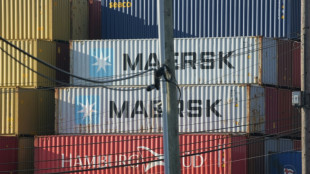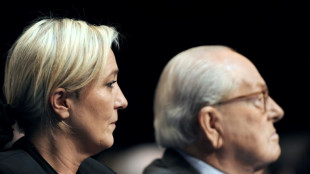
| RYCEF | 1.53% | 7.2 | $ | |
| GSK | 0.66% | 34.185 | $ | |
| RBGPF | -4.54% | 59.31 | $ | |
| NGG | -0.14% | 58.79 | $ | |
| CMSC | -0.69% | 23.33 | $ | |
| BTI | -0.14% | 36.92 | $ | |
| RIO | -0.02% | 58.37 | $ | |
| BP | 2.1% | 31.685 | $ | |
| SCS | -1.96% | 11.22 | $ | |
| JRI | -1.8% | 12.23 | $ | |
| RELX | 0.93% | 46.08 | $ | |
| AZN | 0.04% | 66.865 | $ | |
| VOD | -0.3% | 8.445 | $ | |
| BCC | -2.55% | 117.23 | $ | |
| BCE | -0.06% | 23.925 | $ | |
| CMSD | -0.66% | 23.575 | $ |

Healing by helping: Mexico's acid attack victims
After Mexican mother Carmen Sanchez left her abusive ex-partner he attacked her with acid, leaving her severely scarred. As part of her healing process, she now helps fellow victims rebuild their lives.
In the eight years since her life was changed forever, the 37-year-old has undergone 61 operations, including skin reconstruction and grafts.
"Every day I endure it but I don't know if I will heal completely at some point," said Sanchez, who wears dark glasses to cover traces of the attack.
"It wasn't an accident. I wasn't born that way. He planned it, went and bought the acid and threw it at me. When I look in the mirror, I see him," she said.
Her Carmen Sanchez Foundation -- launched in 2021 to "put a stop to acid violence" -- believes that companionship and friendship are crucial for victims.
It faces challenges such as dealing with a public health system that guarantees only limited treatment for victims, and a judicial system beset by impunity and ineffectiveness, Sanchez said.
Gender-based violence is a major problem in Mexico, which registered around 3,750 murders of women in 2021, of which about 1,000 were classified as femicides.
The foundation has documented 31 acid attacks against women since 2001, of whom six died.
The crime is on the rise, with seven cases in 2021, compared with two on average in previous years, according to the group, whose goal is for victims to regain some enjoyment of life.
"The moments of leisure, the celebration of important dates, going out to eat or simply talking on the phone is a fundamental part of what can keep them on their feet," said its co-president Ximena Canseco.
- 'Remember forever' -
Sanchez, who has two daughters, reported her abusive ex-partner three times but he escaped punishment and sprayed acid in her face in 2014 after she left him.
"He told me that he was going to do something to me that I would remember forever," she said.
Sanchez spent eight months in a public hospital, after which she relied on private doctors who treat victims free of charge.
At the public hospital, "they told me I could live with my scars" and to "be thankful I survived," she said.
After the police failed to arrest her ex-partner, Sanchez tracked him down herself and he was finally captured in 2021.
"I was the one who did all the work," she said.
Yazmin, 34, is one of eight women whom the Carmen Sanchez Foundation helps to obtain free medical treatment, legal advice and psychological therapy.
A year and a half ago, when she was leaving her work, a woman threw a liquid on her, leaving her in agony.
Yazmin lost an ear and suffered burns to her eyelids, neck, legs and one arm.
She suspects her attacker was sent by her ex-partner.
"Days before, we argued on the telephone and he told me to be careful because he had a little surprise for me," said the woman, who did not want to give her full name.
- 'A global problem' -
Yazmin kept silent about her violent relationship for years before the attack, but now she feels liberated thanks to the foundation.
"We're not judged. They don't say: 'They did it to you for a reason.' You feel protected. I thought I was the only one, but I discovered that it is a global problem," Yazmin said.
Among other affected countries, hundreds of acid attacks are reported in India each year, although -- like in Mexico -- experts fear they are only the tip of the iceberg.
Colombia, where the crime is punishable by 50 years in prison, registered 50 cases in 2021, 28 of them against women, according to official figures.
Britain has one of the world's highest rates of recorded acid attacks per capita -- most apparently gang-related and targeting men, according to the charity Acid Survivors Trust International (ASTI).
Martha Avila, 63, calls herself a "collateral victim" of acid violence in Mexico.
In March 2017, she was assaulted by her daughter's Argentine ex-husband.
"He came to attack her, but since he couldn't find her, he came for me. He said he was going to 'destroy what she loved the most,'" she said.
Despite suffering burns on nearly half her body, Avila is glad that she was the victim, not her daughter.
"I couldn't imagine what it's like to have your life destroyed so young, and even more so if he's the father of your children," she said.
U.Dumont--JdB



